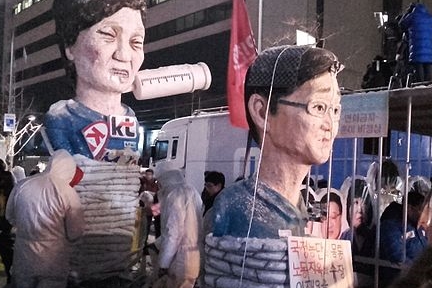Abstract
No one would be surprised if they were told that South Korea had achieved fully-fledged democracy, particularly during the “2016 Candlelight Vigil Revolution,” a series of massive, peaceful, popular protests by citizens holding up candles in the streets and demanding the impeachment of President Park Geun-hye, daughter of former military dictator Park Chung-hee (1961-1979). Park Geun-hye ended up the first elected president of South Korea to be forced to leave office in disgrace when, on 9 March 2017, South Korea’s Constitutional Court upheld the National Assembly’s 9 December 2016 impeachment vote over her involvement in an influence-peddling scandal with her longtime confidante, Choi Soon-sil. South Korean society, heavily divided along conservative and liberal lines, was gripped by political paralysis amidst the turmoil caused by this scandal.
During the period of Park’s presidency (2013-2016), the foreign policy capabilities of the South Korean government had become seriously compromised, especially in relation to issues concerning North Korea. During the Park administration, North Korea’s Kim Jong-un conducted fifty-five tests of mid- or long-range ballistic missiles. These included the Pukguksong No. 1, the nation’s first submarine-launched ballistic missile (SLBM), tested in August 2016, signaling North Korea’s heightened military readiness with its attempt to produce an intercontinental ballistic missile (ICBM) capable of crossing the Pacific and striking the US. During Park’s presidency, North Korea conducted one nuclear test in 2013 and two more in 2016. Given the Obama administration’s reportedly somewhat pusillanimous diplomatic policy of “strategic patience” with respect to North Korean issues, Park appeared, by 2016, to have lost much of her diplomatic leverage in this area, appearing to become increasingly reliant on Xi Jinping’s alleged power in order to control North Korea. South Korea came to look like a mere bystander in regional diplomacy in response to North Korea’s continued threats to the international community.
For Park, it seemed as though North Korea was simply being ticked off when it came to diplomatic matters. International relations and Korea specialist Victor Cha (2015) delivered a commentary regarding Park’s “gravitating into the Chinese orbit” as a deliberately strategic diplomatic “upgrade” to “build a trilateral dialogue among China, South Korea, and her key ally the United States about the [Korean] peninsula’s future.” Park’s vigorous diplomatic efforts, as depicted by Cha, fell short, however, ending up as fumbling in relation to North Korean issues, and frustrating China, whose renewed diplomatic friendship with South Korea peaked when Park sat near Xi at Tiananmen Gate in Beijing to watch a military parade marking the seventieth anniversary of the end of the Second World War on 3 September 2015.
On 8 July 2016, the Park administration announced that it would deploy the Terminal High Altitude Area Defense System (THAAD), an advanced anti-ballistic missile defense system produced by Lockheed Martin, the associated military technology costing the Park administration approximately ten billion US dollars over the four years of her presidency. This provoked a furious reaction by China. Claiming that the THAAD’s X-band radar would penetrate into China to spy on its missiles, the Xi administration immediately retaliated against South Korea by impeding travel to South Korea by Chinese tour groups and issuing fire safety code violations to South Korean retail facilities in China run by Lotte, the conglomerate that had approved a land swap with the South Korean government for the purpose of deploying the THAAD at Seongju, 125 miles south of Seoul. In short, the Park administration allowed its original diplomatic attention to wander, leading it to stray into an international relations quagmire.
What made Park abruptly turn her back on Xi? What diplomatic and military situations involving China, Japan, and the US, as superpowers active in Northeast Asia, can help us in understanding Park’s seemingly peculiar diplomatic decisions? To assist in answering these questions, I will first chronicle some significant diplomatic and geopolitical events that shed light on the strategies and positions of these superpowers, especially in relation to North Korean threats to the region. I will then offer a critical evaluation that can help account for Park’s failed diplomatic legacy with respect to North Korean issues, which I believe can be considered reflective of the broader circumstances leading to her impeachment.

This work is licensed under a Creative Commons Attribution-NonCommercial-NoDerivatives 4.0 International License.

